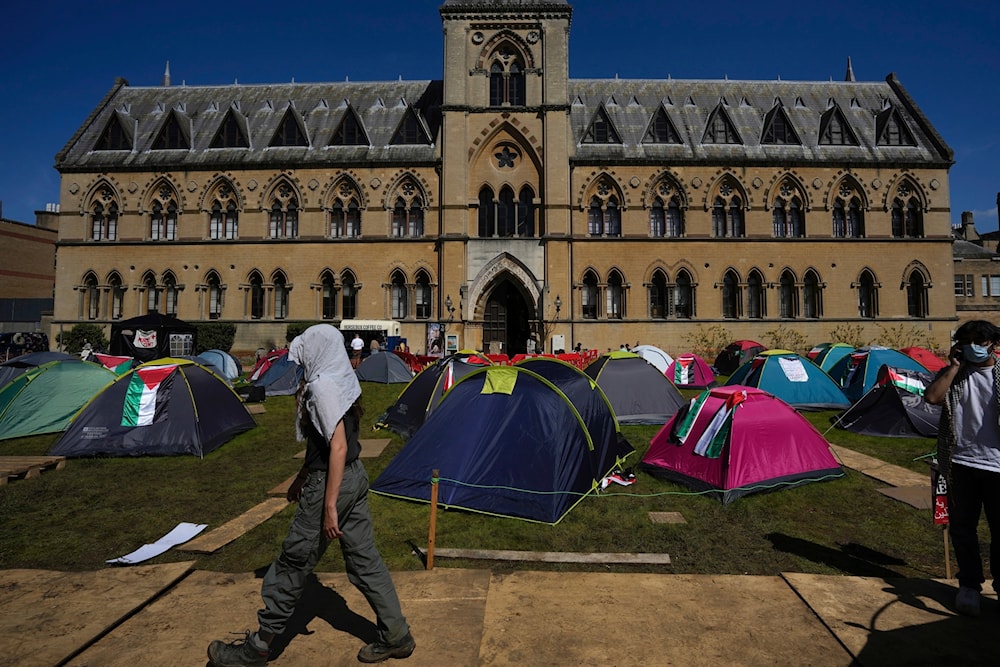US Campus crisis looms as schools warn of Trump cuts: Report
Cuts to higher education and research funding by the president pose a threat to US public health, workers warn.
-

Pro-Palestinians students camp outside the Pitt Rivers Museum at Oxford, in England, on Thursday, May 9, 2024. (AP)
A recent report by The Guardian highlights the deep and lasting impact of funding freezes, budget cuts, and executive orders from the Trump administration on higher education in the US.
Students, researchers, faculty, and university leaders are facing immediate and long-term challenges, with experts warning that these disruptions could shape the landscape of American academia “for decades to come,” as per the report.
Sarah Spreitzer, vice-president and chief of staff of government relations at the American Council for Education, a nonprofit representing over 1,600 colleges, universities, and related organizations, told The Guardian, “It’s sowing a lot of chaos on campuses”.
“These changes will have long-term impacts on the American public and post-secondary education that I don’t think we can really even start to understand,” she stressed.
Research grants have been slashed or frozen, federal scholarships halted, and efforts to reduce administrative costs for National Institutes of Health (NIH) research funding to 15% have left institutions scrambling to cover the financial burden, Spreitzer explained.
The Trump administration’s proposed federal budget includes billions of dollars in cuts to research and higher education institutions. Reductions in research funding linked to foreign aid—such as through the US Agency for International Development—have led to lab closures. Trump has also threatened to withdraw federal funding from universities that permit “illegal” protests.
As a result, universities have implemented hiring freezes, layoffs, furloughs, and reductions in graduate admissions. Some institutions have rescinded job offers and scaled back their research operations.
“Institutions are scrambling to figure out how they are going to support those students because they’re unable to access the federal funding, or are they just going to end the programs,” Spreitzer said. “Changing the indirect cost rate doesn’t suddenly make research cheaper to do. Someone is going to have to bear that cost.”
'Institutions are retrenching'
Many universities have already begun to cut programs or prepare for further reductions. The University of Pennsylvania, for instance, has reduced graduate admissions for its medical schools by 35% for fall 2025. Graduate students nationwide have reported that their admission acceptances have been revoked.
Top institutions, including MIT and Stanford, have enacted hiring freezes, while Brown and Johns Hopkins warned this week of potential layoffs due to threats to federal funding.
“Our admissions have been paused for a number of big grad departments,” said Levin Kim, a graduate worker and chair of Higher Education Labor United, a coalition representing over 200,000 academic workers.
Kim, who is also president of UAW Local 4121, representing academic workers at the University of Washington, told The Guardian, “We’re seeing a lot of uncertainty. Careers are being curtailed right now. It’s not like once things are funded, it can just pick right back up. It’s wreaking havoc throughout the whole pipeline.”
He noted that Trump’s policies have created a “big chilling effect” on research funding, despite ongoing legal challenges to prevent these cuts and freezes.
“The attacks on research being carried out right now are attacks on workers as well as American public health infrastructure that will have impacts for decades to come,” Kim said.
“Clinical trials have been paused. Research has been paused on things like Alzheimer’s research and cancer, things that affect everyone. There is a government takeover right now to sign away Americans’ health in order to line the pockets of a few billionaires,” the president of UAW Local 4121 added.
Layoffs, lab closures...
On his part, Todd Wolfson, president of the American Association of University Professors, echoed similar concerns about the impact on faculty and the broader future of higher education, particularly as institutions scale back projects in response to Trump’s anti-diversity, equity, and inclusion (DEI) initiatives.
“Billions of dollars in research has been frozen, and that’s research on things that every American depends on,” Wolfson said.
“Members of mine having to lay people off, having to close their labs, having to ask for special circumstances to be able to keep rare supplies, like animals, alive. It’s been a complete, utter destruction of the United States research infrastructure,” he added.
Furthermore, Wolfson pointed out that since World War II, the federal government has worked closely with higher education institutions to maintain US leadership in research and development.
“Institutions are retrenching, and they’re going to retrench at pretty quick rates. They’re going to lay people off. Tuition is going to skyrocket and they’re going to cut back on graduate programs. We’re going to train fewer doctors and fewer engineers, and this is going to have a very bad effect on broader American society,” Wolfson warned.
“The Trump administration, at the same time that they’re saying that they’re trying to create a great country, are destroying the sector that’s one of the most critical in having a great, profitable, and healthy democratic country,” he concluded.
Read next: Trump cuts $400 million to Columbia Uni. over pro-Palestine protests

 5 Min Read
5 Min Read








